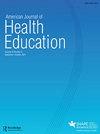健康饮食固定(正食症)与过去家庭生活及年轻人饮食态度的关系
IF 0.8
Q4 PUBLIC, ENVIRONMENTAL & OCCUPATIONAL HEALTH
引用次数: 0
摘要
摘要背景与其他饮食问题相比,文献中关于健康饮食固定(HEF)的信息较少。目的了解以前的家庭经历对个人和其他饮食障碍有多方面影响,对更好地理解HEF很重要。方法本研究调查HEF与以往的家庭经历以及饮食态度之间的关系。这是一项基于定量分析方法的横断面调查设计,以18-24岁(n=225)为方便样本。结果除了与HEF显著相关的子因素“有限的社会活动”和与健康原发性厌食症显著相关的亚因素“健康和社会问题”外,HEF和HO均与过去的家庭生活无关。结果显示,参与者的饮食态度与HEF(r=.57,p<.001)和HO(r=.23,p=.001)有显著关系。讨论结果表明,HEF患者的饮食态度紊乱。此外,从业者应该意识到,家庭因素可能是原发性厌食症的风险因素。健康教育实践的转化这些结果可能有助于教育和提高健康教育工作者和心理健康专业人员对饮食失调和HEF的识别、治疗和恢复的认识。本文章由计算机程序翻译,如有差异,请以英文原文为准。
Relationship Between Healthy Eating Fixation (Orthorexia) and Past Family Life, and Eating Attitudes in Young Adults
ABSTRACT Background In comparison to other eating problems, there is less information on healthy eating fixation (HEF) in the literature. Purpose Understanding the effects of previous family experiences, which have a multidimensional impact on the individual and on other eating disorders, is important to better comprehend the HEF. Methods The current study examined the relationships between HEF and previous family experiences as well as eating attitudes. It is a cross-sectional survey design with a convenience sample of 18–24-year-olds (n = 225) based on a quantitative analysis method. Results Except for “limited social activity,” a sub-factor significantly related to HEF, and “health and social problems,” a sub-factor significantly related to healthy orthorexia (HO), both HEF and HO did not significantly relate to past family life. The outcomes showed that the participants’ eating attitudes had a significant relationship with HEF (r = .57, p < .001) and HO (r = .23, p = .001). Discussion The findings suggest that people with HEF have disordered eating attitudes. Furthermore, practitioners should be aware that family factors may be a risk factor for orthorexia. Translations to Health Education Practice These results may help to educate and increase awareness among health educators and mental health professionals regarding the identification, treatment, and recovery of eating disorders and HEF.
求助全文
通过发布文献求助,成功后即可免费获取论文全文。
去求助
来源期刊

American Journal of Health Education
PUBLIC, ENVIRONMENTAL & OCCUPATIONAL HEALTH-
CiteScore
1.70
自引率
10.00%
发文量
36
期刊介绍:
AJHE is sponsored by the American Association for Health Education of the American Alliance for Health, Physical Education, Recreation and Dance. The mission of the American Association for Health Education(AAHE) is to advance the profession by serving health educators and others who strive to promote the health of all people through education and other systematic strategies.AAHE addresses the following priorities •Develop and promulgate standards, resources and services regarding health education to professionals and non-professionals •Foster the development of national research priorities in health education and promotion. Provide mechanisms for the translation and interaction between theory, research and practice.
 求助内容:
求助内容: 应助结果提醒方式:
应助结果提醒方式:


